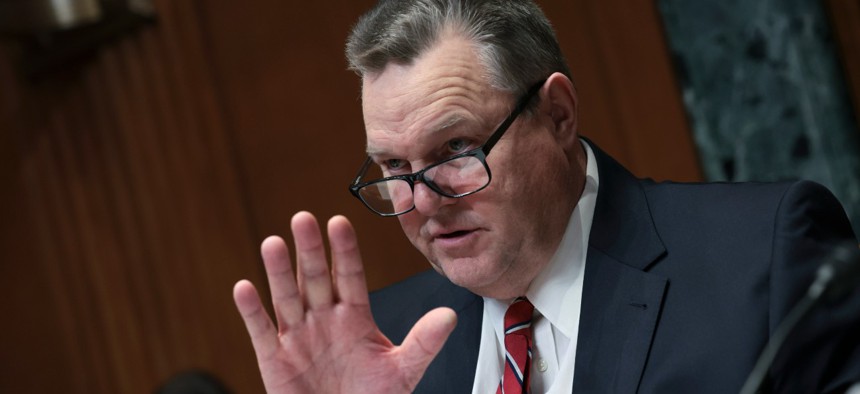
Sen. Jon Tester, D-Mont., is one of the sponsors of the bipartisan bill. Win McNamee/Getty Images
VA Docs Are One Step Closer to Earning More than $400K Annually
A Senate committee advanced a sweeping compensation overhaul for VA health care workers that would create a more market-based pay system.
A Senate committee on Thursday advanced a measure to make health care personnel at the Veterans Affairs Department eligible for a pay bump as part of a sweeping compensation reform package aimed at leveling the playing field as the agency seeks to compete with the private sector in recruiting doctors and other staff.
The Senate Veterans' Affairs Committee approved in a bipartisan vote raising the $400,000 pay cap for VA physicians, dentists, optometrists and podiatrists. The VA Clinician Appreciation, Recruitment, Education, Expansion and Retention Support (CAREERS) Act (S. 10) is designed to help VA offer market-rate salaries more closely aligned with those provided in the private sector and fill vacancies throughout the department as it prepares to fold more veterans into its health care network.
The bill was introduced by Committee Chairman Sen. Jon Tester, D-Mont., and Sen. John Boozman, R-Ark., but despite this bipartisan support, some Republicans expressed reservations with elements of the measure during a truncated markup session on Thursday. Sen. Jerry Moran, R-Kan., said he would allow the bill to move forward only after Tester promised to continue revising the legislative text and to hold a hearing on the reforms the Biden administration is seeking.
“More public discussion and more stakeholder feedback will help improve these proposals,” Moran said, noting he was pleased the bill included “common-sense guardrails” for the potential pay increases.
The measure would require the VA secretary to approve a pay cap waiver when necessary to help meet the goal of hiring for hard-to-fill positions that have particularly impacted rural facilities. It would also create new awards and bonuses tied to recruiting, relocation and retention. VA Secretary Denis McDonough and other officials have labeled the need to revamp the department's pay caps and overall compensation system as a key priority to carry out VA's growing mission.
The measure would provide other benefits to VA employees, such as paying for licensure exam costs for those enrolled in the department’s scholarship programs and reimbursing ongoing professional education for more employees. It would also create new requirements for VA to report to Congress on its hiring and workforce data.
VA has for years been on a quest to boost its rolls—and it has found significant success, growing its workforce by more than 100,000 employees over the last decade. Still, the department has struggled with large-scale vacancies. The issue received renewed attention after President Biden signed the Honoring Our Promise to Address Comprehensive Toxics (PACT) Act into law, which makes potentially millions of veterans newly eligible for VA benefits and care due to their service-connected exposure to burn pits.
After passing that legislation last Congress, Moran said, “It is our job to see that the VA faithfully implements the laws that we passed.”
Boozman said the CAREERS Act has been a product several years in the making.
“One of the problems that we've got is recruiting and I think that's especially true in rural areas,” Boozman said. “As I go around the country, whether it's rural Arkansas, rural wherever, it’s simply difficult to get any sort of health care professionals, much less at the VA. So this is something that's important.”
Lawmakers and the Biden administration have pushed for better pay for VA workers as a key element of their joint agenda to boost care at the department. Passed as part of the fiscal 2022 omnibus funding package, VA has already begun implementing the Retention and Income Security Enhancement (RAISE) Act. That has led to VA approving pay increases for nearly 10,000 nurses, boosting their salaries to a new cap of $203,000 per year. Any nurse at the previous cap, or within 10% of it and working in certain markets, automatically saw a pay increase.
The department has rewarded high performers more generously after the PACT Act removed caps on bonuses and allowed for special contribution awards worth $25,000. It has increased efforts to bring on early career talent by using new expedited hiring for recent graduates and increasing student loan repayments.
Moran noted he wanted to hear from VA on its difficulties in implementing the firing provisions of the 2017 VA Accountability and Whistleblower Protection Act, saying reforms to hiring at the department should be paired with reforms to firing. VA has faced a long series of setbacks in legal battles when trying to use the 2017 law to quickly remove employees, the most recent of which occurred last month before the Merit Systems Protection Board.
“If VA is going to have the flexibility they need to hire the best people, they need the same flexibility to let employees go when they are not a good fit,” Moran said.
In a letter to McDonough last week, Rep. Mike Bost, R-Ill., who chairs the House Veterans' Affairs Committee, criticized MSPB’s decision as undermining accountability at the department and asked whether the Biden administration would appeal the decision.
The Senate committee on Thursday also advanced measures to authorize $4 billion in spending for construction and upgrades of more than a half-dozen medical facilities and to allow VA to study the impacts of cannabis on chronic pain, post-traumatic stress disorder and other issues impacting veterans. Veterans and their advocates have long cited the potential benefits of marijuana for treating pain and PTSD, while criticizing VA for standing in the way of additional research.
NEXT STORY: What Not To Do With Your TSP Account







